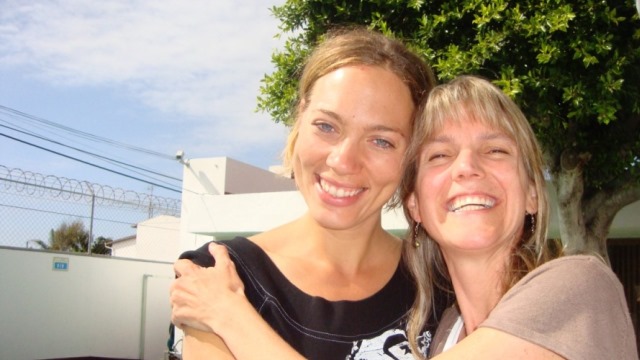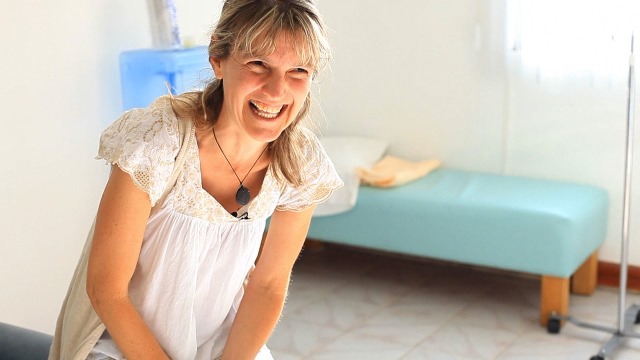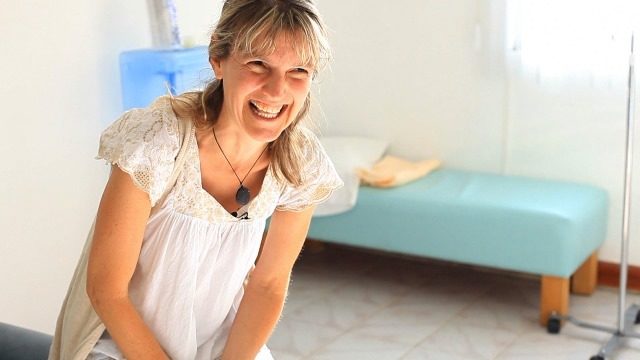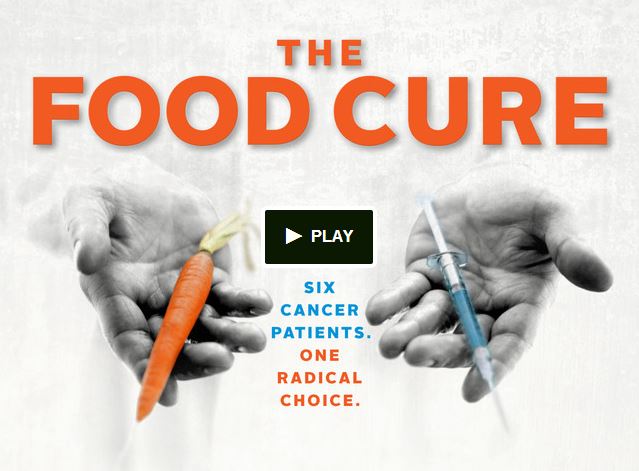 I first met Marie, one of the protagonists of my upcoming documentary The Food Cure, in the sunny courtyard of the licensed Gerson clinic in Mexico. We had spoken on the phone once before, and she greeted me with a big, radiant smile.
I first met Marie, one of the protagonists of my upcoming documentary The Food Cure, in the sunny courtyard of the licensed Gerson clinic in Mexico. We had spoken on the phone once before, and she greeted me with a big, radiant smile.
I was expecting someone who looked and acted “sick,” but it struck me that she seemed perfectly healthy. Marie introduced me to her sister-in-law, who was there to support her, and invited me to join them for a swim in the clinic’s tiny, non-chlorinated swimming pool.
It was a confusing day. Neither the setting nor the patients’ attitudes correlated with my expectations. The place looked like a shabby but clean Mexican hotel, complete with cacti, a fountain, and the beach just a few blocks down the road. I even saw a pod of dolphins playing in the breaching waves.
In contrast to the subdued atmosphere I knew from hospital oncology wards, the people sauntering around this place looked like a bunch of international vacationers and retirees.
The fact that most of them were terminal cancer patients made me wonder: were they all in denial about the precariousness of their situation?
My question was answered over lunch. The patients and their caregivers (each patient brings along a friend or family member to support them throughout their stay at the clinic) were all seated at a single long table. They chatted freely about their cancer types and were cracking jokes.
Far from being unaware, many of them had already been through years of conventional treatments and considered this place to be their very last chance.
To my amazement, they kept returning to a big, colorful buffet and piling heaps of food on their plates – first soup, then salad, then warm dishes, then desert. The loss of appetite often associated with cancer treatments clearly didn’t seem to be a problem around here. Nor did this nutritional therapy involve much fasting, from the look of it.
Later that day, I interviewed Marie at a coconut stand by the beach. Despite her healthy appearance, this smart, 44-year old osteopathic physician and mother of four had two different types of cancer, one of which was an advanced-stage breast cancer, type triple negative. She told me that the weeks before arriving here had been the worst in her life. Her oncologist had recommended an aggressive chemotherapy treatment and warned Marie not to Google the side-effects.
After trying to be a “good” patient, she eventually disobeyed and read up on the treatment. The low success rates and the damage to vital organs that the chemo would cause shocked her, and after several torturous nights in which she endlessly weighed out the pros and cons in her head, Marie decided to cancel her appointments and try the Gerson Therapy instead. Its principle of strengthening the body’s own immune system so that it can fight the cancer cells made sense to her.
Now that she was here, she attributed her well-being to a feeling of deep relief about her choice, as though somebody had given her back her organs and her life.

She would not always have that feeling over the course of the next three years. I visited her periodically in her home in Montreal and filmed Marie and her family as she underwent the rest of the strict treatment.
On the contrary, there were times when she felt that many of the things she loved most had been taken from her: traveling, having coffee with friends, going out to dinner with her husband, drinking a glass of wine while watching a movie–almost everything that rendered everyday life enjoyable was gone. Banished. Often she felt like a prisoner in her own home.
It turns out that taking your health “back into your own hands” is not an easy matter. The idyllic first days in the Mexican clinic when the staff brought her fresh-pressed vegetable juices every hour were a distant memory.
Preparing all the juices, enemas, and special Gerson meals, while dealing with four children and a job is a gargantuan, almost insurmountable task, even with the help of an incredibly supportive husband.
I developed a deep respect for Marie and the other patients in my film over the next three years. Whether turning their backs on conventional medicine and choosing a holistic method was the ‘right’ or ‘wrong’ decision, it was definitely a courageous and lonely one.
Going against the recommendations of doctors and the heartfelt advice of friends and pleading family members when one’s life is at risk is not an easy thing to do. And in a society where most aspects of social life are linked to food and drink in some way, being excluded from social activities for such a long time is excruciating.
As long as our world remains so inhospitable to this form of treatment, I am convinced that it takes a strong and very special kind of person to make this choice.
In the following weeks I encountered the other people who would become the protagonists of my film:
- Fred, a Canadian truck driver and stonemason with prostate cancer that has metastasized to his seminal ducts and bones.
- Verena, from a small town in Switzerland, accepted surgery but refused the chemotherapy, radiation, and hormone treatments she was prescribed.
- Little Jeremiah, the cutest protagonist by far, was diagnosed with a rare form of lymphoma at only six months old.
- Michele, in Mississippi, was diagnosed with stage I breast cancer and refused all traditional treatments
- Christine, who underwent four unsuccessful rounds of chemotherapy in rural France before deciding to try the Gerson Therapy.
Over the last years, whenever anyone has asked me what the film I was working on was about, they looked at me with pitying eyes, “Oh jeez, that’s a tough topic.” “Wow, how do you deal with such a sad subject over such a long period of time, especially since you’ve gotten to know the patients so well?”
I never knew how to respond to that question, because the truth is that it was neither very sad nor very tough. There have been incredibly gut-wrenching moments and I am not saying that shooting this film was always easy, but what all the protagonists have in common is a great sense of humor.
They are strong, beautiful, and very fun people. I never felt like I was doing a film about cancer or dying. I filmed them as they dealt with exploding juicing machines, partners, and medical tests, laughed with their neighbors, educated their children, cooked beautiful food, and fought for their lives.
The patients taught me a lot about the choices we make. They were my inspiration to keep going whenever I had doubts about my film. Whatever obstacles were getting in my way seemed small compared to the difficulties they braved on a daily basis. Filming them confirmed what I suspected from the beginning: that they have a mighty story to tell.
It’s a story that could have repercussions for all of us and that is likely to change the way we view many things, from the food on our tables to the search for a cancer cure and the way modern medicine handles degenerative disease. I am very proud to be working on bringing you their stories.
Over 1,500 backers contributed to a crowd-funding campaign on Kickstarter to help us complete this film independently.
Visit The Food Cure’s website, watch the trailer and sign-up for updates!
In case you missed it, Sarah has written another post about her upcoming film as well:
Note: This film is independently produced by Sarah Mabrouk. Donations to this project will go directly to the filmmakers, not to the Gerson Institute.
This article was originally published March 3, 2014.




Comments4
This is awesome! I’m so happy to see this film in the works. I’m home from work today and was online looking at some frivolous “fun” splurge makeup items. Had them in my “cart” when I came across the email with the link for this film. Wow. What could be more important than getting the word out that FOOD CURES CANCER? I’ve been a supporter of holistic health for a long time. I emptied my “cart” and donated the money I would have spent on my splurge to this film. And I feel SOOO good. 🙂 ROCK ON, SARAH and CANCER FIGHTERS EVERYWHERE! 🙂
I don’t have cancer (that I know of) thank the Lord but I do have an autoimmune disease and can well-empathize as I know just how these people might feel by their choice to go against convention which renders them so isolated from the day to day of our fast food & alcohol-oriented society. I can’t partake either most of the time, not unless I wish to feel the extremely ill repercussions if I do.
This movie is going to “Hit-The-Fan” sorta speak and i’m going to be right along side of it watching Chemical companies (like Monsanto), Pharmacutical Companies and big GA “Flinch” and “Cringe” and enjoying every minute of it, they need a dose of their own stew.
But on a happier note, i am going to share this with everyone i know (as they are willing to watch it) and hope that it is not too late for some because as we know, you cannot change a person, that’s God’s job…but we can share the message with them in hopes that they will after seeing this, make an informed and intelligent decision about their health because i’m tired of seeing all my friends and family around me dying of things they do not have to die from and getting “Scared” into things like chemo and radiation from Westernized medicine.
Westernized medicine does have it’s place and believe that it is trauma and critical care but the rest is up to us and we “CAN” take control of our own health. 🙂
An amazing story about 6 people that go through a journey on a path less taken. Perhaps if the Gerson method does work to cure cancer, it can be used to prevent it as well. 🙂
Comments are closed.